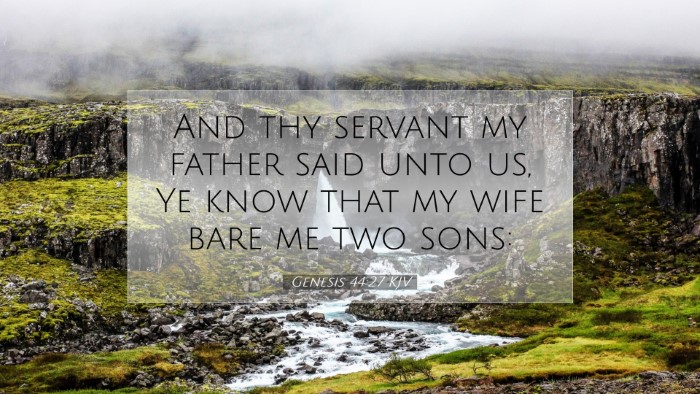Commentary on Genesis 44:27
The verse in question, Genesis 44:27, states:
"And your servant my father said, 'You know that my wife bore me two sons.'"
This part of the narrative occurs during a pivotal moment in the story of Joseph and his brothers. As we delve into the commentaries from renowned scholars such as Matthew Henry, Albert Barnes, and Adam Clarke, we uncover profound insights into the implications of this verse for understanding familial relationships, repentance, and the overarching themes of God's providence and reconciliation.
Contextual Background
Genesis 44 records the events following Joseph's test of his brothers after they have come to Egypt during a time of famine. The emotional weight of this verse encapsulates the sentiments of Jacob, Joseph's father, and reflects the complicated dynamics of family relationships.
Significance of the Two Sons
The mention of the two sons is significant, as noted by Matthew Henry, who emphasizes that this reference not only speaks to Jacob's affection for Joseph and Benjamin but also illustrates the deep-seated grief over the presumed loss of Joseph. Henry points out:
- “Jacob's heart was profoundly attached to these sons, for they were the children of his beloved Rachel.”
- “Their prominence in Jacob's narrative showcases the importance of familial bonds and the heartache that emerges from separation and loss.”
Jacob's Character and Grief
Albert Barnes provides theological insight by examining Jacob's emotional state. Barnes posits that Jacob's declaration about his two sons reveals:
- “The profound depth of his prior grief over the supposed death of Joseph.”
- “His fear of losing Benjamin, thus bringing him back to a state of deeper mourning.”
This recognition of Jacob's sorrow adds layers to our understanding of the familial context in which the brothers operate and helps readers appreciate the gravity of their actions toward one another.
Thematic Exploration
Thematically, Genesis 44:27 opens a window into the ideas of repentance and restoration within the narrative of Joseph's brothers. Adam Clarke observes:
- “The brothers' reference to Jacob signifies their awareness of the emotional weight their decisions carry, not just in their lives but in the life of their father.”
- “It underscores the importance of honesty and integrity in the restoration of their family unit.”
Repentance and Responsibility
Clarke’s commentary suggests a moral lesson drawn from the verse, which could be of particular interest to pastors and theologians:
- “The acknowledgment of their father’s grief is a pivotal moment that calls for genuine repentance.”
- “Their current predicament serves as a reminder that actions carry consequences not only for oneself but for other people who are deeply invested in our lives.”
This reflection invites deeper conversations around the nature of sin, forgiveness, and the transformative power of grace, particularly in the dynamics of human relationships.
God's Sovereignty and Providence
Underpinning the emotional and narrative layers of Genesis 44:27 is the theme of God's sovereignty. Both Henry and Barnes articulate that, despite the hardship and deception experienced by Joseph and his brothers, God's providence guided the events toward reconciliation.
- Henry states: “Even in the midst of pain, God's plans unfold toward a glorious resolution.”
- Barnes highlights: “Their journey back to Joseph serves not only as a literal return but also a spiritual one.”
Lessons for Contemporary Readers
For contemporary readers and scholars, Genesis 44:27 serves as a reminder of the importance of understanding our family legacies and the responsibilities that come with them. The relationship between Jacob and his sons can be used as a case study in the dynamics of human relationships, forgiveness, and the importance of coming to terms with the past.
Additionally, the realization that every action can have ripple effects in the lives of loved ones provides a sobering reflection on personal accountability.
Conclusion
In conclusion, Genesis 44:27 is rich with theological, emotional, and moral implications. By examining the insights of Matthew Henry, Albert Barnes, and Adam Clarke, we can appreciate the narrative's depth. It provokes thought regarding the complexities of relationships, God's divine plans, and the need for authenticity in our dealings with one another.
As pastors, students, theologians, and scholars reflect on this verse, they are encouraged to explore the intersection of sorrow and hope, humanity and divinity, alongside the overarching narrative of redemption woven throughout Scripture.


